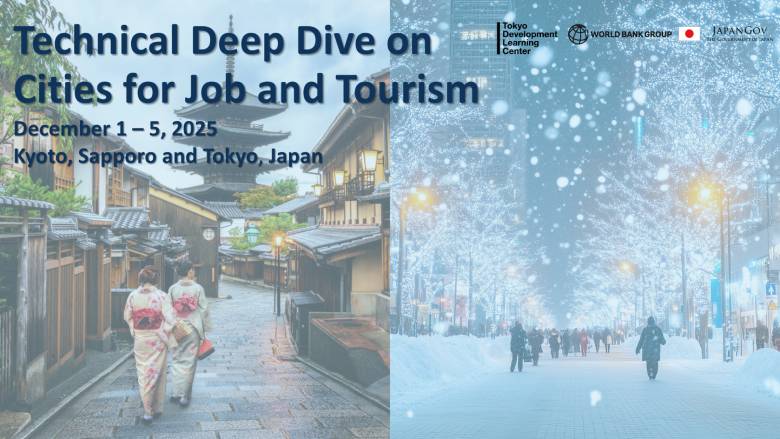

The Tokyo Development Learning Center (TDLC) will host a Technical Deep Dive (TDD) on Cities for Tourism and Jobs from December 1 to 5, 2025, in Kyoto, Sapporo, and Tokyo. The program will bring together senior policymakers, technical experts, and private-sector representatives from 9 World Bank client countries—Albania, Argentina, the Dominican Republic, Indonesia, Kenya, Mozambique, Nepal, Pakistan, and Sri Lanka—for a total of about 50 participants working in tourism, local economic development, and urban management. Experts from Japan, CPP partner cities, the World Bank Group and partner organizations – UNESCO, UN Tourism, the World Economic Forum and the World Travel and Tourism Council—will share knowledge and practical experience throughout the week.
Tourism is one of the world’s fastest-growing economic sectors and a major source of job creation. In 2024, it accounted for nearly 10 percent of global GDP and supported an estimated 357 million jobs. As one of the World Bank’s five priority sectors for large-scale job creation, tourism drives investment in hospitality, transport, cultural industries, environmental conservation, and health tourism—contributing to diversified and inclusive economic growth. When cities invest in tourism, they invest in jobs, entrepreneurship, and opportunities for local communities.
Cities are central to national tourism systems. Their concentration of experiences, infrastructure, and services attracts visitors and connects them to surrounding regions. Yet many cities face challenges such as infrastructure gaps, regulatory constraints, fragmented governance, overcrowding, and rising housing pressures. Unlocking tourism’s potential therefore requires not only quality infrastructure but also strong governance, coordinated institutions, and active partnerships with businesses and local communities.
This TDD will explore how stronger enabling policies, improved infrastructure and urban environments, and deeper linkages with local communities and businesses can help cities unlock tourism’s potential. Participants will learn practical frameworks for assessing tourism assets, prioritizing investments, and coordinating interventions that create vibrant and inclusive destinations. Discussions will also reflect global evidence showing how well-planned urban tourism can generate new jobs, strengthen city finances, protect cultural assets, and support women and youth through expanded economic participation.
Participants will also learn from global case studies and Japan’s rich tourism experiences. Tokyo, Kyoto, and Sapporo illustrate how cities balance growth with cultural preservation, leverage creative assets, and manage tourism pressures. Engagement with these cities through the TDLC platform will support delegations in developing strategies that advance sustainable tourism development and job creation in their own contexts.